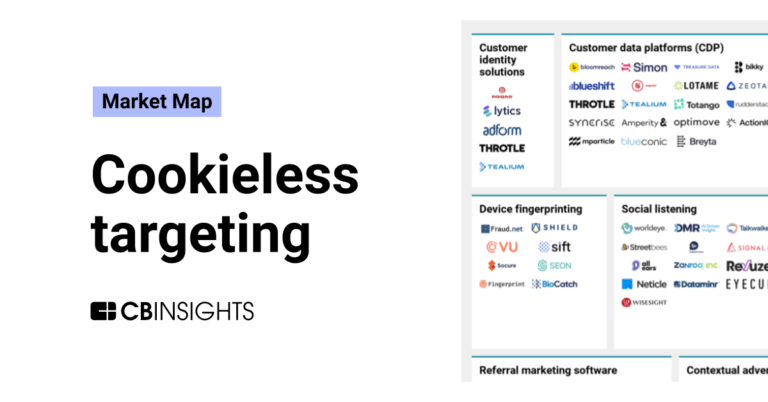
Signal AI
Founded Year
2013Stage
Acq - Fin | AliveTotal Raised
$101.55MLast Raised
$164.37M | 2 mos agoRevenue
$0000Mosaic Score The Mosaic Score is an algorithm that measures the overall financial health and market potential of private companies.
-40 points in the past 30 days
About Signal AI
Signal AI focuses on providing real-time insights and data-driven decision-making tools in the media monitoring and market intelligence industry. The company's main services include media monitoring, reputation management, and market intelligence, which are designed to help businesses understand their brand perception, identify trends, and stay informed about breaking news and emerging topics. It was founded in 2013 and is based in London, United Kingdom.
Loading...
ESPs containing Signal AI
The ESP matrix leverages data and analyst insight to identify and rank leading companies in a given technology landscape.
The public relations (PR) software market offers solutions to help PR and communications teams measure the impact of their efforts and generate coverage through earned media. These software solutions process data from various digital platforms, including social media, news, and review sites to provide real-time actionable insights that directly impact marketing and customer-facing activities. The …
Signal AI named as Leader among 7 other companies, including Meltwater, Muck Rack, and Tagger Media.
Loading...
Research containing Signal AI
Get data-driven expert analysis from the CB Insights Intelligence Unit.
CB Insights Intelligence Analysts have mentioned Signal AI in 2 CB Insights research briefs, most recently on Aug 21, 2023.

Aug 14, 2023
The cookieless targeting market mapExpert Collections containing Signal AI
Expert Collections are analyst-curated lists that highlight the companies you need to know in the most important technology spaces.
Signal AI is included in 2 Expert Collections, including Regtech.
Regtech
1,453 items
Technology that addresses regulatory challenges and facilitates the delivery of compliance requirements. Regulatory technology helps companies and regulators address challenges ranging from compliance (e.g. AML/KYC) automation and improved risk management.
Artificial Intelligence (AI)
16,627 items
Companies developing artificial intelligence solutions, including cross-industry applications, industry-specific products, and AI infrastructure solutions.
Latest Signal AI News
Oct 10, 2025
10 October 2025 We here at MBS have had the privilege of placing exceptional leaders and, indeed, Communications leaders into some of the most innovative and high-growth businesses in the UK and internationally. What’s become increasingly clear to us, is the growing strategic importance of the Communications function. Today, Corporate Affairs and Communications are not just support roles, they are central to shaping business direction, reputation, and resilience. Earlier this week, we collaborated with Signal AI on a breakfast event which brought together leaders in this space to discuss how the function is evolving against an increasingly digital backdrop. We were delighted to be joined by Dex Hunter-Torricke, who has led Communications at Facebook, SpaceX and Google DeepMind. Dex, in conversation with David Benigson, founder and CEO of Signal AI, explored how the rise of AI as the ultimate knowledge engine is reshaping the landscape of leadership and communication. As information becomes increasingly commoditised, it’s human skills – creativity, judgment, empathy, and adaptability – that will set individuals and teams apart. These qualities, they argued, will define the next generation of exceptional communicators and leaders. Dex described that whilst politicians and business leaders are focusing on “fixing potholes, an entirely new transport system will be required for this new AI era”. It was inspiring to explore what this means for the future of Corporate Affairs and Communications – a function uniquely positioned to guide organisations through rapid technological, reputational, and societal change. “AI now holds all the world’s knowledge – what will set us apart is how we use it.” As the conversation opened up, it became clear that the Communications function, which was once defined by messaging and media, has become a strategic discipline concerned with how organisations interpret the world around them. One leader described Corporate Affairs as “a living sensor for the business”, while another called it “the conscience of the organisation”. There was agreement that the job is no longer about defending reputation once it is threatened, but about designing systems and cultures that make integrity the default. Artificial intelligence has accelerated that transformation. The tools now available offer visibility and reach that would have seemed impossible only a few years ago, but they also challenge long-held ideas about what it means to lead, decide and communicate. Dex described being at the frontier of this change. Using the example of his ‘digital twin’ – an AI produced version of himself that is able to learn, analyse and optimise at a remarkable speed – he highlighted not only the extraordinary pace at which this space is evolving but also how much more thought now needs to go into implementing these new tools, and of course the speed and agility these tools can equip leaders with. AI is now capable of producing a ‘digital twin’ This prompted reflections on how leaders are being pushed to operate in a permanent state of adaptation, responding to technologies that outpace regulation and, at times, ethics. The recommendation that everyone should have a personal, team and company plan for AI resonated across the room as it became clearer that Corporate Affairs leaders need to think about not just what AI can do, but how it should be applied responsibly. That means setting principles and frameworks that align technological opportunity with organisational values, and thinking through a plan for the short, medium and long term. Throughout the discussion, a distinction emerged between knowledge and skills. As one attendee observed: “AI now holds all the world’s knowledge – what will set us apart is how we use it.” The ability to interpret, question and apply information thoughtfully will likely be the mark of human intelligence in the age of machine capability and several leaders agreed that the future will belong to those who can combine technological fluency with empathy, creativity and judgement. The conversation underlined that in a world that will continue to be saturated with data and information, judgement and wisdom will become more critical than ever. “The point is not to know everything, but to know what matters most.” The group also recognised that technology’s impact is not only confined to systems, but touches on identity and leadership too. “We’re at a hinge point,” Dex reflected, “where the old structures are losing relevance, and new ones haven’t yet been built.” He described leadership today as an exercise in interpretation rather than control, a skill that depends as much on moral clarity as on technical expertise. Throughout the discussion, there was a balance between optimism and realism. The group recognised the potential of AI to strengthen judgement, but they were clear that technology is not a substitute for leadership. It can show patterns, predict risks and trace sentiment, yet it cannot decide what should matter. “Tools can tell you what is happening,” someone remarked, “but they can’t tell you who you are.” Dex framed this as a deeper shift in the nature of leadership itself. The industrial age, he said, rewarded the ability to manage information and maintain order, whereas the digital age rewards interpretation. Leaders are being asked to read complexity, find meaning and act before the full picture is clear. “The future belongs to those who can connect the dots,” he said, describing today’s environment as an “in-between moment” in which the old systems are losing relevance and new ones have yet to solidify. However, it is true that the same technologies that amplify risk can also strengthen credibility if used thoughtfully. One participant noted that, “for the first time, we can quantify reputation as rigorously as revenue”, and several agreed that the opportunity lies in how these insights can be used to protect brands as well as improve them. “Tools can tell you what is happening, but they can’t tell you who you are.” Signal AI’s role in this new landscape reflects that ambition. Its technology, built initially on discriminative AI that classifies data with precision, has evolved to incorporate generative AI that can summarise, synthesise and contextualise information in human-readable ways. The company’s new platform, AskAIQ, allows senior leaders to query complex datasets and receive concise, actionable insight. “The point,” said David, “is not to know everything, but to know what matters most.” The group spoke candidly about the personal dimension of this work. Many admitted to feeling the weight of constant change, and the difficulty of staying grounded when the external environment demands perpetual motion. But the responsibility to equip people in this ever-changing landscape is not simply a personal one or an organisational one. Dex argues that it is up to the people who have been entrusted with securing our futures – those in government – who should be prioritising education, both in a formal capacity but also as a cultural investment that will support lifelong learning, as the future will not belong to those who know the most, but to those who can learn the fastest. He said: “The most important thing governments can do is to prepare citizens for a world where learning never stops.” Looking ahead, the leaders who will thrive are those who see AI not as a barrier, but as a lens – one that brings clarity, insight, and opportunity. Success will belong to those with a well-defined plan at the personal, team, and business level, and the agility to adapt and execute that plan in a rapidly evolving landscape. As Dex powerfully concluded: “We can’t stop the future from arriving, but we can decide the values it arrives with.”
Signal AI Frequently Asked Questions (FAQ)
When was Signal AI founded?
Signal AI was founded in 2013.
Where is Signal AI's headquarters?
Signal AI's headquarters is located at 44 Featherstone Street, London.
What is Signal AI's latest funding round?
Signal AI's latest funding round is Acq - Fin.
How much did Signal AI raise?
Signal AI raised a total of $101.55M.
Who are the investors of Signal AI?
Investors of Signal AI include Battery Ventures, Tech Nation Future Fifty, MMC Ventures, Hearst Ventures, Mercuri and 21 more.
Who are Signal AI's competitors?
Competitors of Signal AI include Ren, Vivid + Co, Cision, Notified, Talkwalker and 7 more.
Loading...
Compare Signal AI to Competitors

Cision specializes in media intelligence and communication solutions, operating within the public relations and corporate communications sectors. The company offers a platform, CisionOne, which provides media monitoring, analytics, journalist outreach, social media listening, and management services. Cision serves professionals across various industries. It was founded in 1867 and is based in Chicago, Illinois.

Onclusive provides media monitoring, analysis, and public relations tools within the communications industry. The company offers services such as tracking media coverage and analyzing communications impact. Onclusive serves PR and communications teams across various sectors. Onclusive was formerly known as AirPR. It was founded in 2011 and is based in Burlingame, California.

Babel Street provides data analytics and intelligence services within the cybersecurity and risk management sectors. The company offers a platform that processes unstructured, multilingual data into insights for identity, threat, and risk mitigation operations. Babel Street's services are available to government, commercial, and law enforcement organizations, offering support for decision-making, compliance, supply chain risk management, and investigations. It was founded in 2009 and is based in Reston, Virginia.

CARMA is a media intelligence service provider that offers media monitoring and communications evaluation programs. The company provides services that assist clients in understanding the media landscape and utilizing data insights, with support from a team of PR measurement consultants. It was founded in 1984 and is based in Dubai, United Arab Emirates.

Meltwater specializes in media monitoring and social and consumer intelligence within the business intelligence sector. The company offers a suite of artificial intelligence (AI)-powered tools designed to monitor brands, analyze market trends, and provide insights for strategic decision-making. Meltwater's services cater to various sectors, including public relations, marketing, and sales. Meltwater was formerly known as Magenta News. It was founded in 2001 and is based in San Francisco, California.

Cyabra provides services focused on identifying fake social media profiles, harmful narratives, and content generated by artificial intelligence within the cybersecurity and public relations sectors. The company serves the public sector and corporations. It was founded in 2018 and is based in Tel Aviv, Israel.
Loading...

